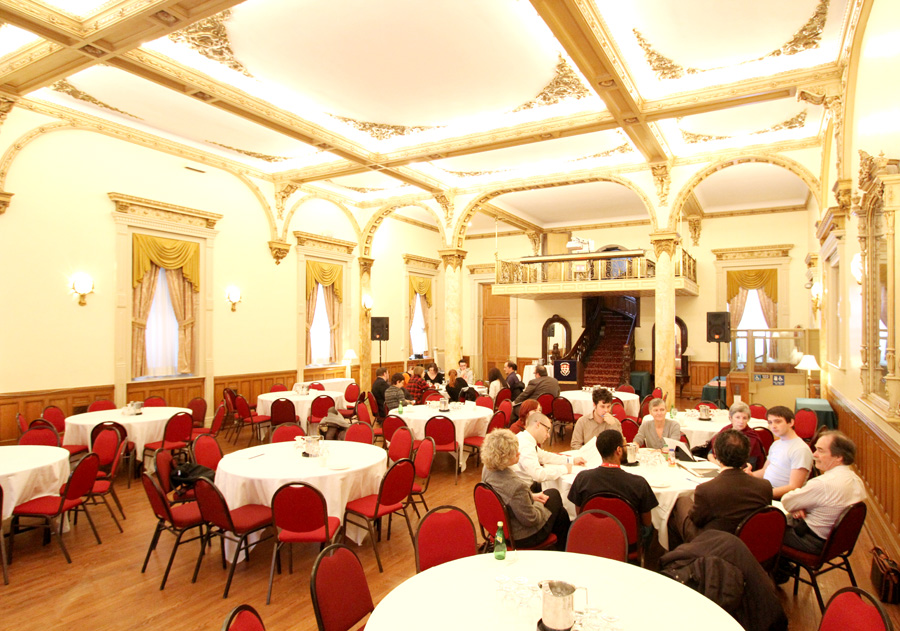On Nov. 10, the McGill Institute for the Study of Canada (MISC) hosted four experts with media and legal background at the McGill Faculty Club to discuss the aftermath of the Patrick Lagacé case. Montreal police had been collecting metadata—information that indicates the time, date, and location you called someone, for example—from La Presse columnist Lagacé’s phone to determine who was leaking information in an internal investigation of one of it’s officers. The event was organized and moderated by Andrew Potter, director of MISC.
The panelists spoke about how the media reacted to the revelation of the police tapping journalists in Quebec and the legal implications of police surveillance. The Senior Director of Continuous Improvement at La Presse, Yann Pineau, considered the spying of journalists to be a wake-up call.
“We [journalists] were naive because we never thought police would go to that extent,” Pineau said.
Pineau added that journalists in Quebec now need more training to protect their sources and themselves and must learn to use digital tools to encrypt metadata.
Executive Director of the Professional Federation of Quebec Journalists (FPJQ) Caroline Locher further denounced Lagacé’s tapping, as well as three Radio-Canada journalists. “Quebec is similar to a police state,” Locher said.
Locher gave numerous examples of attacks on journalism, such as the Charlie Hebdo attacks and Trump’s threats to sue journalists, but praised some jurisdictions for extensively protecting journalists’ rights and their sources’ anonymity.
“In Belgium, it is illegal to spy on journalists unless there is an immediate threat of terrorism or death,” Locher said.
Locher noted that since the revelation of police surveillance of the media, sources will likely be more hesitant about speaking to journalists.
“The journalists are able to tell the truth about what happens because the sources trust them […] This is not about journalists, it is about the public who will not get information, who will be left in the dark,” Locher said.
McGill Law Professor Fabien Gelina cautioned the audience not to jump to conclusions because the evidence presented by the police to the Justice of Peace (JP) has not yet been made public. The JPs are officials appointed by the lieutenant governors of Canada's provinces, and by the commissioners of Canada's territories. They supervise the legality of police activities, such as accepting or rejecting police’s warrant requests. In the Lagacé case, it was the JP who authorized the Montreal police to collect the journalist’s metadata.
“It is hard to make a judgement on an investigation without all the facts,” Gelinas said.
Furthermore, it would be difficult to legally further the informers’ right to anonymity. According to media lawyer Mark Bantey, there are three ways of doing so: As a privilege, as class-based–similar to lawyer-client confidentiality–and as a case-by-case analysis. The former two would formally protect the anonymity of informers and by extension, there would be less leeway for JPs to grant warrants.
“Currently, the warrants are given on a case-by-case basis by the Justice of Peace, who balances public interest and law enforcement,” Bantey said. “The JP decides to recognize the sources’ right to anonymity or not”.
Bantey also noted that it is hard to draw a clear definition as to who is and isn’t a journalist. Therefore, the constitutional court refused to acknowledge the protection of sources by privilege or class-based relations, thus keeping the JP’s authority to individually assess warrant requests.
“To throw a constitutional immunity around such a heterogeneous and ill-defined group […] and whatever sources they want to protect would blow a giant hole in law enforcement and other basic rights,” Bantey said, quoting the court’s decision.
Pineau took the opportunity to denounce not only a legal problem, but an institutional one.
“[Prime Minister] Trudeau’s reaction was very timid […] the police asked for a warrant without really questioning themselves,” he said. “However, a lot of police officers were ashamed by what happened”.








